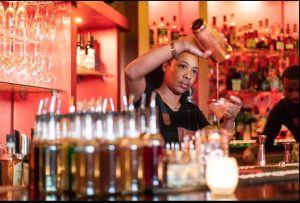
Credit: The Detroit Free Press
It is estimated that 600,000 businesses open each year in the United States. They vary in size and span, some closing and some remaining in business. Michigan has about 902,000 small businesses that are owned by and employing our fellow Michiganders, our neighbors.
Starting a business is an intimidating venture. There are multiple risks that one must consider before making the decision to open your doors to the public. These risks can also be multiplied when the person starting a business has not had the same privileges as others looking to do the same thing. According to the Census Bureau, only 18.7 percent of U.S. employer-owned businesses were owned by minorities as of 2019.
These exciting new businesses play into a multitude of community wealth building’s aspects. Trust and belonging are an important component to the Michigan Municipal League’s community wealth building work. These small businesses allow for members of the community to play a key role in their local economy and keep that wealth within their community. Additionally, the new jobs that have become available will attract others to the community and retain others who were already seeking employment.
We wanted to highlight some of the new and exciting businesses that have started in our beloved mitten state that are owned by Black, Indigenous, (and) People of Color (BIPOC).
Detroit itself is home to 50,000 small businesses that are owned by people of color, and it is estimated that Detroit’s population is 89.5 percent BIPOC. Trust and belonging are vital to community wealth building. It is important that the owners of our businesses are representative of the population that they serve.

Credit: The Detroit Free Press
An exciting new edition was opened this May: a speakeasy named Willow. It is Detroit’s first Black-owned craft cocktail lounge and is connected to a soul restaurant called SavannahBlue. The co-owners Ron Scott, J.D. Simpson, and Roger Yopp opened the restaurant in 2016 and have now added the speakeasy which plays up to a mystifying persona.
Willow encapsulates the beauty of the original speakeasys with only 50 seats and dim lighting. They also have created non-alcoholic cocktail options for patrons who do not wish to consume alcohol.
Later this summer, Kalamazoo will also be gaining a Black-owned cocktail bar and live music venue. Dabney & Co. will be offering a variety of cocktails that were created by some of the earliest Black mixologists in the nation.
They explain on their website that they felt that there was a lack of places where people from all different backgrounds could go to be able to socialize and enjoy good music. Their goal is to be able to provide their patrons with a fresh perspective on the beauty of Black culture.
New businesses are opening across the state, and some are moving their headquarters to Michigan. That is the case for the sustainable, Latinx-owned footwear brand called HOLO Footwear. After considering spaces in North Carolina and Oregon, they decided to move their headquarters from Portland to Grand Rapids. They plan on hiring 61 workers.
Founded in 2020, the brand is already being sold at Nordstrom, Dick’s Sporting Goods, REI, and other well-known retailers. The goal of founder Rommel Vega is to create sustainable footwear that is attainable for everyone. Each shoe is made of at least 50 percent recycled materials, and the company wants to keep the shoes at prices that are affordable for the average consumer. They offer a variety of shoes for both women and men that work for a variety of daily activities. You can view a photo gallery of their assorted footwear courtesy of their Instagram account here.
While these new businesses will have a more obvious contribution to our economy, which can be easily measured, they will also have other immeasurable effects.
For Willow and Dabney & Co., they will attract patrons from within and outside of the community as well. These patrons will be able to gain a new experience, immerse themselves within perhaps a new culture, or continue on their learning. HOLO Footwear will help start conversations about sustainable fashion within the state and help put Michigan on the map.
The starting of these businesses will also help spark inspiration and initiative by others. This is especially important because the owners of these businesses are owned by minorities and BIPOC, who have been underrepresented as business owners.
Representation matters. Going to a business or being employed by a business where the owner represents a part of oneself whether that be a fellow Michigander, or a fellow person of color, means something. Children growing up today will have more experiences in which they can see themselves in a position that previously may not have been seen as possible. These experiences will shape their minds and help them gain confidence that they can achieve their dreams.
At the root of all these new ventures is an impact that will create positive experiences and change for Michiganders, and perhaps even reach those outside of our peninsula. That is what community wealth building is all about.